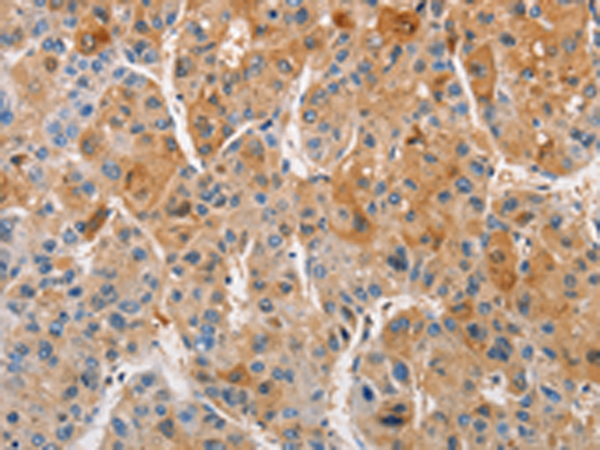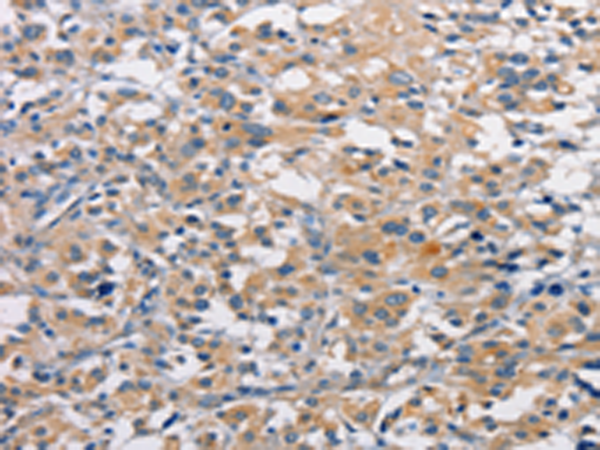


| WB | 咨询技术 | Human,Mouse,Rat |
| IF | 咨询技术 | Human,Mouse,Rat |
| IHC | 1/25-1/100 | Human,Mouse,Rat |
| ICC | 技术咨询 | Human,Mouse,Rat |
| FCM | 咨询技术 | Human,Mouse,Rat |
| Elisa | 1/2000-1/5000 | Human,Mouse,Rat |
| Aliases | PKCE; nPKC-epsilon |
| WB Predicted band size | 84 kDa |
| Host/Isotype | Rabbit IgG |
| Antibody Type | Primary antibody |
| Storage | Store at 4°C short term. Aliquot and store at -20°C long term. Avoid freeze/thaw cycles. |
| Species Reactivity | Human, Mouse, Rat |
| Immunogen | Fusion protein of human PRKCE |
| Formulation | Purified antibody in PBS with 0.05% sodium azide and 50% glycerol. |
+ +
以下是关于PRKCE抗体的3篇模拟参考文献示例,涵盖不同研究方向和实验方法:
---
1. **文献名称**: *"Selective Activation of Protein Kinase C Epsilon by Antibody-targeted Signaling in Cardiac Hypertrophy"*
**作者**: Tanaka K, et al.
**摘要**: 本研究利用PRKCE特异性抗体,通过免疫共沉淀和体外激酶实验,揭示了PRKCE在心肌细胞肥大信号通路中的选择性激活机制。发现PRKCE与Gq蛋白偶联受体相互作用,促进病理性心脏重塑,为靶向治疗提供了依据。
2. **文献名称**: *"PRKCE Antibody-based Detection in Glioblastoma Prognostic Stratification"*
**作者**: Müller S, et al.
**摘要**: 通过免疫组化(IHC)和生存分析,研究者使用PRKCE抗体检测胶质母细胞瘤患者的肿瘤样本,发现PRKCE高表达与肿瘤侵袭性和患者生存期缩短显著相关,提示其作为预后生物标志物的潜力。
3. **文献名称**: *"Role of PRKCE in Neuronal Apoptosis: Insights from Knockdown and Antibody Blockade Experiments"*
**作者**: Lee JH, et al.
**摘要**: 采用PRKCE抗体进行神经元培养物的功能阻断实验,结合siRNA敲低技术,证实PRKCE通过调控Bcl-2家族蛋白表达参与氧化应激诱导的神经元凋亡,为神经退行性疾病机制提供了新视角。
---
**说明**:以上文献为模拟示例,实际引用时需通过学术数据库(如PubMed、Web of Science)检索真实文献。若需具体文章,建议使用关键词“PRKCE antibody”、“PKCε function”或结合研究领域(如癌症、神经科学)进一步筛选。
The protein kinase C epsilon (PRKCE or PKCε) antibody is a crucial tool for studying the epsilon isoform of the protein kinase C (PKC) family, a group of serine/threonine kinases involved in diverse cellular signaling pathways. PKCε belongs to the novel PKC subfamily, which requires diacylglycerol (DAG) or phorbol esters for activation but does not depend on calcium. Structurally, it contains a regulatory domain with tandem C1 motifs for lipid binding and a catalytic domain for phosphorylation. PKCε plays roles in cell proliferation, survival, migration, and stress responses, with implications in cancer, cardiac diseases, and neurological disorders. Dysregulation of PKCε is linked to tumor progression, chemoresistance, ischemic preconditioning in the heart, and neuroinflammation.
PRKCE antibodies are used in techniques like Western blotting, immunohistochemistry, and immunofluorescence to detect PKCε expression, localization, and activation status. Specificity is critical, as PKC isoforms share structural homology; rigorous validation via knockout controls or siRNA knockdown ensures minimal cross-reactivity. Researchers employ these antibodies to explore PKCε's involvement in signaling pathways (e.g., NF-κB, MAPK) and its interactions with downstream targets. In drug discovery, they help assess therapeutic agents targeting PKCε in diseases like cancer or heart failure. Overall, PRKCE antibodies are indispensable for unraveling the kinase's pathophysiological roles and translational potential.
×